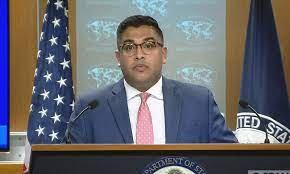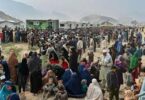Deputy Spokesperson of the US State Department, Vedant Patel assured that the US wants to see a stable and prosperous Pakistan. While addressing a media query put forth by The Frontier Post at his press briefing at the US State Department, Mr. Patel said that Pakistan and the United States are cooperating on several fronts including trade, technology, agriculture, and combating terrorism. Meanwhile, the Frontier Post correspondent has raised queries regarding Pakistan-US relations and US interest in domestic politics in Islamabad, several American Spokesmen at the White House, State Department, and Pentagon had expressed multiple times that the US has no favorite in the politics of Pakistan and that the US wants to see a prosperous Pakistan.
Pakistan has witnessed persistent political instability, economic degradation, and a sharp upsurge in terrorism in the former Federally Administrated Tribal Areas (FATA) and other regions adjacent to the Pak-Afghan border in the Khyber Pakhtunkhwa and Balochistan over the past several months. There had been continuous terrorist attacks on Law Enforcement Agencies (LEAs) and military installations that caused grave concerns in the government and the masses regarding the sharp rise of terrorism in the country, while the global community including the UN and the United States were also worried about the security situation in Pakistan’s border regions and inside Afghanistan. Meanwhile, a particular faction of the media and anti-Pakistan elements had been continuously raising questions at the global forums regarding safety and security of Pakistan’s nuclear arsenal to create doubts and constitute global consensus against Pakistan’s nuclear program.
Realistically, an upsurge in violence and terrorism, continued political unrest, fragile economy coupled with a weak political government is a matter of concern for local authorities as well as global institutions and major nations in the world including the US because these situations can easily lead to a civil insurgency that would be disastrous for a nuclear-armed Pakistan. Therefore the global community perceives terrorism as a global challenge and is continuously engaged with Pakistan to collectively curb this menace through joint work and mutual collaboration. The international community, friendly nations, and civil society are surely worried about the prevailing turmoil and continued instability in Pakistan. The sane voices from across the world including political analysts think tank panels and scholarly institutions repeatedly forecast alerts and urge Pakistani warring political groups to pause their tussle, restore peace and stability, and collectively work for economic revival, elimination of terrorism and extremism from the country.
The recent political unrest and mob violence by the PTI workers had badly tarnished the image of the country, which is already embattled with terrorism, extremism, and ethnic polarization. Unfortunately, politics and ego are of high importance for Pakistani leaders, while national interests, public well-being, and global perception have no value to them. Amid heightened political violence and the tussle between the warring groups, the defense forces of the country are currently engaged in a four-front war with internal and external enemies of the country. The challenge of defending territorial frontiers, and national sovereignty, along with maintaining professionalism and national unity in the face of high-level defamation campaigns by the so-called ultranationalists and violent political groups is not an easy task for Pakistani institutions.
The Pakistani nation and its leaders must review the whole gambit of their national affairs ranging from increasing extremism and violence in the society, political ethics, corruption, the way of governance, unnecessary patriotism of military men, and over-activism of judges that derailed democracy, ruined the economy and badly destroyed the national unity. No enemy can harm Pakistan if our men and women do not attack the national institutions, uphold the law and respect their fellow citizens. The change is not possible, until and unless the public play the role of an adjudicator and prosecutes disloyal politicians in the electoral process.







